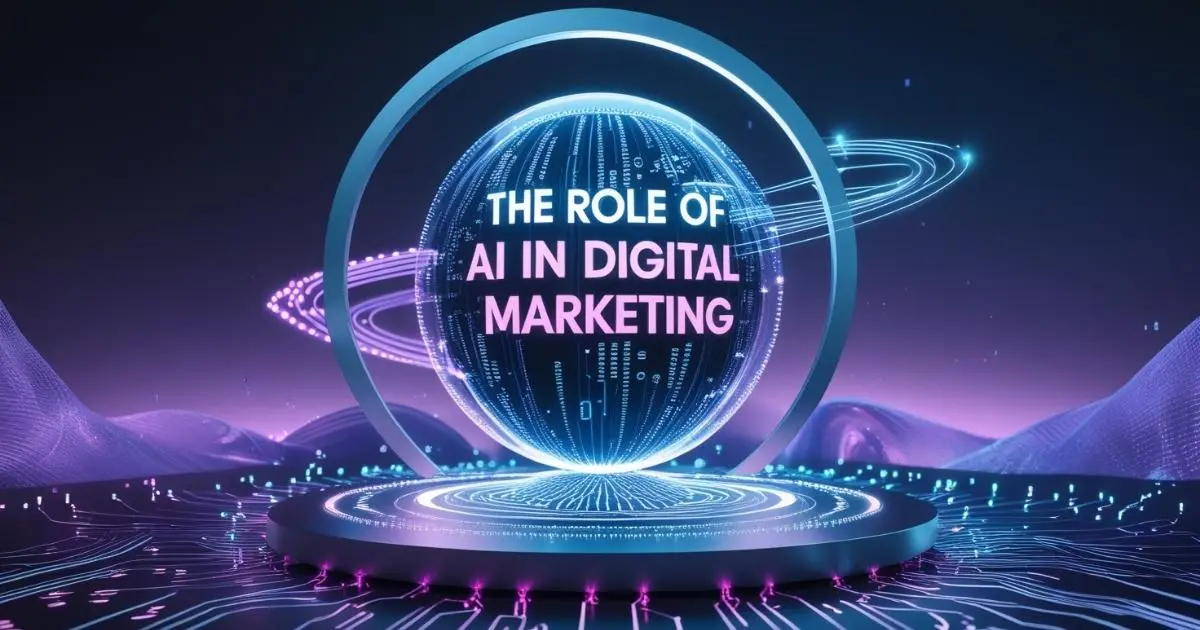Introduction: How AI is Revolutionising Digital Marketing
Imagine running a marketing campaign that optimises itself in real time—without human intervention. Your ads adjust based on audience behaviour, your emails personalise themselves for each recipient, and your content strategy evolves based on what’s trending. This isn’t the future—it’s happening now, thanks to AI in marketing.
Artificial intelligence is reshaping the digital marketing landscape, enabling businesses to operate smarter, faster, and more efficiently. From automating repetitive tasks to delivering hyper-personalised experiences, AI-driven digital marketing is no longer a luxury but a necessity for brands looking to scale.
One of AI’s biggest strengths is automation. Marketing automation tools powered by AI streamline processes such as email marketing, social media scheduling, and ad optimisation—saving businesses time and improving campaign performance. But AI goes beyond automation; it also enhances decision-making through data analysis. Machine learning algorithms can process vast amounts of data to predict customer behaviour, segment audiences, and optimise content strategies.
AI is also transforming customer engagement. Chatbots and virtual assistants provide instant responses to customer inquiries, while AI-powered content creation tools help brands produce high-quality, data-driven content at scale.
As artificial intelligence in business continues to evolve, its impact on marketing will only deepen. The companies that embrace AI’s potential will gain a competitive edge—delivering smarter campaigns, maximising efficiency, and driving real business growth.
What is AI-Driven Digital Marketing?
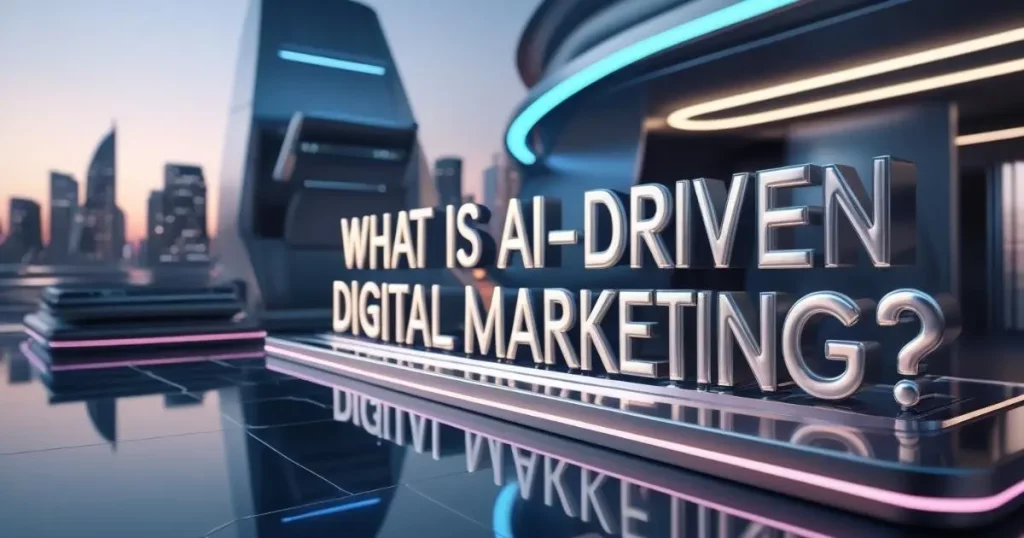
AI-driven digital marketing refers to the use of artificial intelligence technologies to automate, optimise, and enhance marketing efforts. It enables businesses to streamline processes, analyse vast amounts of data, and deliver highly personalised experiences—at scale. By leveraging AI, marketers can focus on strategy and creativity while automation takes care of repetitive tasks like email segmentation, ad targeting, and content generation.
At the core of AI-driven digital marketing are three key technologies:
- Machine Learning (ML): ML algorithms analyse historical data to identify patterns, predict outcomes, and optimise marketing strategies. For example, AI-powered recommendation engines suggest products based on user behaviour, increasing conversion rates.
- Natural Language Processing (NLP): NLP enables AI to understand and generate human-like text, powering tools like chatbots, AI copywriters, and voice search optimisation. This technology helps brands engage customers with relevant and conversational messaging.
- Predictive Analytics: By analysing customer behaviour, AI can anticipate future trends and suggest data-backed decisions. Predictive analytics helps marketers refine ad targeting, improve customer segmentation, and personalise content based on individual preferences.
With AI, digital marketing is becoming more intelligent, efficient, and results-driven. Businesses that leverage AI marketing automation tools can gain deeper insights, boost engagement, and drive better ROI—all with minimal manual effort.
The Benefits of AI in Marketing
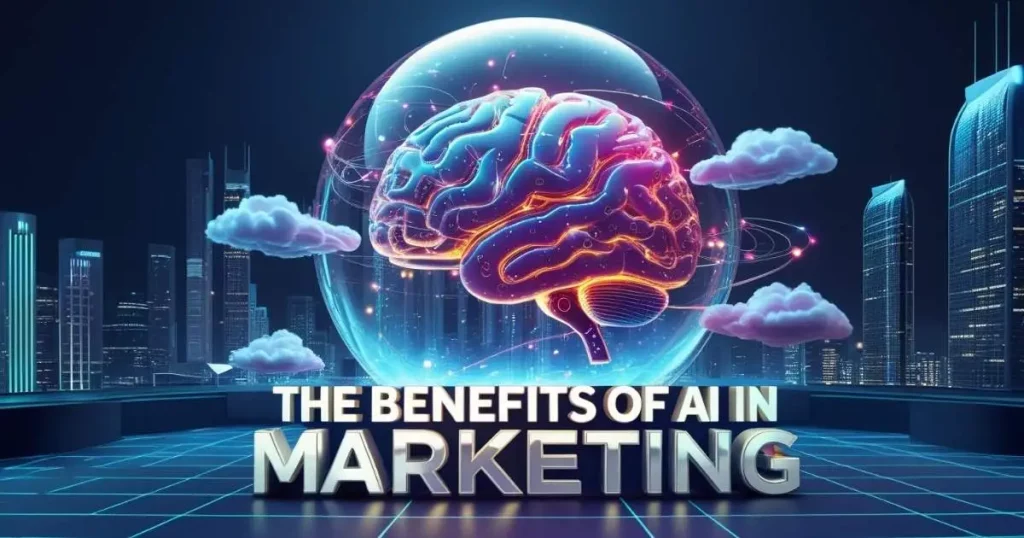
Artificial intelligence is revolutionising digital marketing by making it more efficient, personalised, and data-driven. Businesses that leverage AI-driven digital marketing gain a competitive edge by automating tasks, optimising customer experiences, and enhancing decision-making.
1. Increased Efficiency and Cost Savings
AI marketing automation tools eliminate time-consuming manual tasks such as email scheduling, social media posting, and ad bidding. This allows marketing teams to focus on high-value activities like strategy and creative development. By reducing human workload and minimising errors, AI helps businesses save time and cut operational costs.
2. Personalised Customer Experiences at Scale
Today’s consumers expect personalised interactions. AI analyses customer behaviour, purchase history, and preferences to deliver tailored content, recommendations, and offers. AI-powered chatbots provide instant, customised responses, while AI-driven email marketing ensures the right message reaches the right person at the right time.
3. Improved Decision-Making with Data-Driven Insights
AI processes vast amounts of data in real time, uncovering trends and patterns that would be impossible for humans to analyse manually. Predictive analytics helps marketers refine ad targeting, optimise campaigns, and make smarter business decisions—leading to better ROI.
4. Enhanced Lead Generation and Nurturing
AI can identify high-intent leads, score them based on behaviour, and automate follow-ups with personalised messaging. Chatbots and virtual assistants engage prospects 24/7, increasing conversion rates and ensuring no potential customer falls through the cracks.
By harnessing AI, businesses can drive more effective marketing campaigns, build stronger customer relationships, and achieve sustainable growth.
Key AI-Powered Marketing Automation Tools
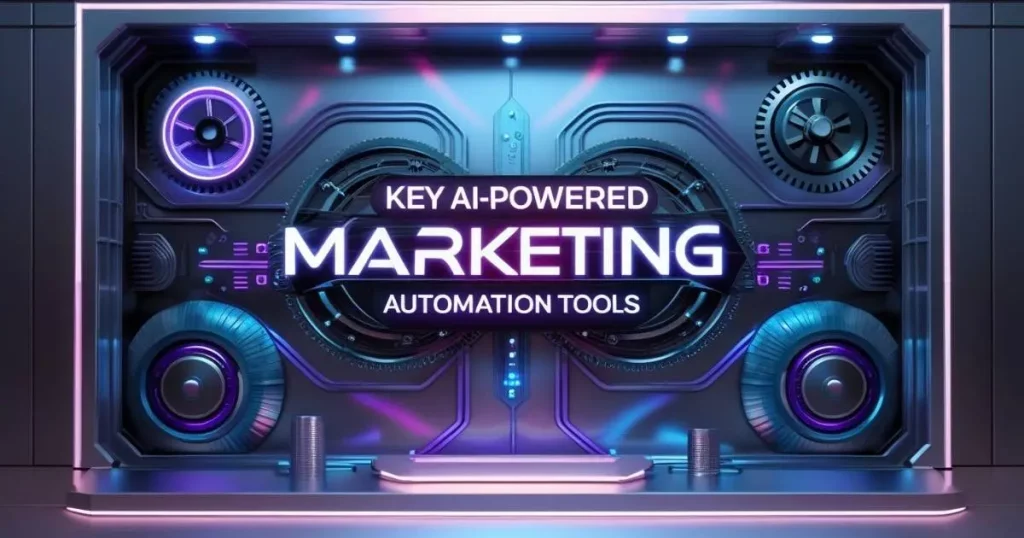
AI-driven digital marketing is powered by a range of automation tools that help businesses optimise campaigns, engage customers, and improve overall efficiency. Here are some of the most impactful AI marketing tools across different areas:
1. Chatbots & Conversational AI
AI-powered chatbots provide instant responses to customer queries, improving engagement and reducing response times. These tools use Natural Language Processing (NLP) to simulate human-like conversations.
🔹 Examples: Drift, Intercom, ChatGPT for customer support
2. AI for Content Creation & SEO
AI-driven platforms can generate high-quality blog posts, social media captions, and even video scripts. AI also enhances SEO by analysing search trends and optimising content for higher rankings.
🔹 Examples: Jasper, Copy.ai, Clearscope, SurferSEO
3. Predictive Analytics & Customer Insights
AI analyses user behaviour to predict trends and optimise marketing strategies. These tools help businesses understand customer intent and refine targeting.
🔹 Examples: HubSpot, Salesforce Einstein, Google Analytics AI
4. Programmatic Advertising & AI-Powered PPC
AI automates ad placements by analysing user data in real time, ensuring maximum reach and efficiency while minimising ad spend.
🔹 Examples: Google Ads Smart Bidding, Meta (Facebook) AI Ad Targeting, Adzooma
By leveraging these tools, businesses can scale their marketing efforts, enhance personalisation, and drive better results with minimal manual effort.
How to Implement AI in Your Digital Marketing Strategy
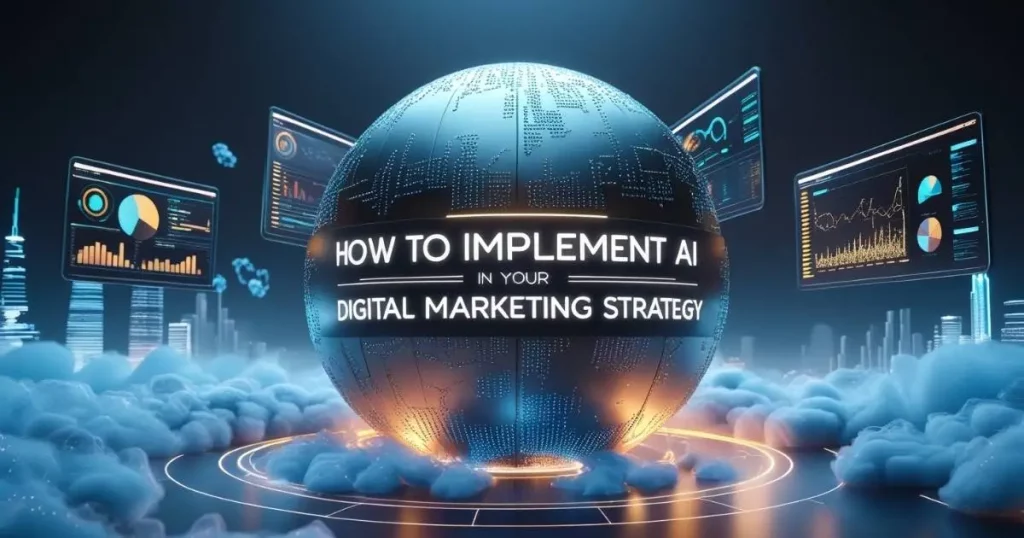
Integrating AI into your marketing strategy doesn’t require a complete overhaul—it’s about identifying the right tools and gradually automating processes to enhance efficiency and performance. Here’s a step-by-step guide to getting started:
1. Define Your Marketing Goals
Before adopting AI, identify the key areas where automation can drive the most impact. Are you looking to improve customer engagement, boost lead generation, or enhance content creation? Defining your objectives will help you choose the right AI tools for your business.
2. Choose the Right AI Tools
With a wide range of AI-powered marketing automation tools available, selecting the right ones is crucial. Consider:
- Chatbots for instant customer service (e.g., Drift, Intercom).
- AI-driven SEO & content tools to optimise blog posts (e.g., Jasper, SurferSEO).
- Predictive analytics for customer insights (e.g., HubSpot, Google Analytics AI).
3. Integrate AI with Your Existing Marketing Stack
Ensure that AI tools seamlessly connect with your CRM, email marketing platform, and analytics software. This integration helps maintain smooth workflows and enhances data-driven decision-making.
4. Monitor Performance and Optimise
AI marketing tools continuously learn and improve. Regularly analyse key performance indicators (KPIs) such as conversion rates, engagement levels, and cost per acquisition (CPA) to refine your AI-powered strategy.
By implementing AI strategically, businesses can unlock new levels of efficiency, personalisation, and growth in their marketing efforts.
The Future of AI in Digital Marketing
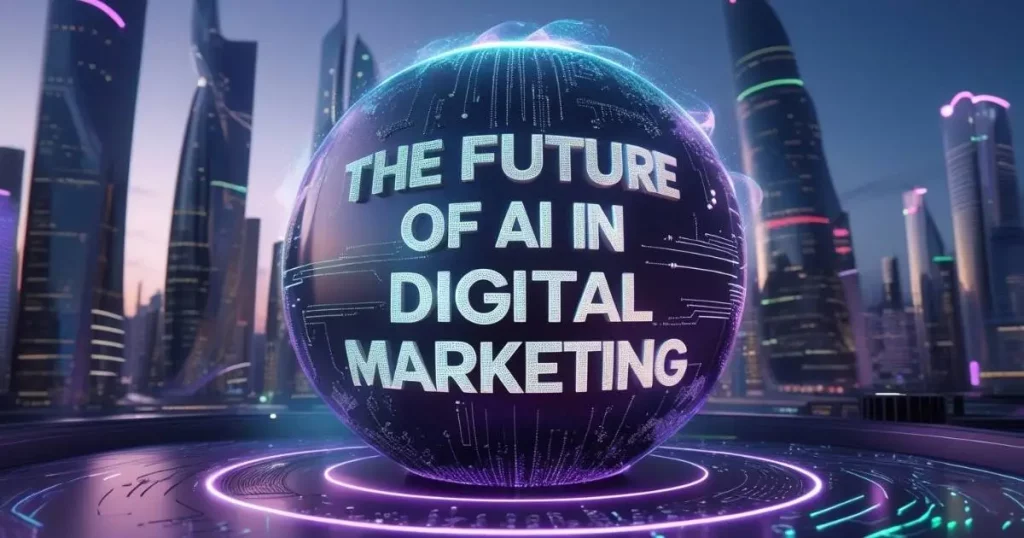
AI is not just shaping the present of digital marketing—it’s defining its future. As technology continues to advance, AI will play an even greater role in how businesses engage with customers, optimise campaigns, and drive growth.
1. The Rise of Hyper-Personalisation
Consumers expect brands to understand their needs. AI will enable marketers to deliver hyper-personalised experiences by analysing real-time behavioural data, predicting customer preferences, and tailoring content accordingly. Dynamic AI-driven recommendations, like those used by Netflix and Amazon, will become standard across industries.
2. AI-Generated Content & Creativity
AI is already assisting with content creation, but in the future, it will go beyond simple copywriting. Advanced AI models will generate video content, interactive ads, and even personalised storytelling experiences—blurring the line between human and machine-generated creativity.
3. Voice Search & Conversational AI
As voice assistants like Alexa and Google Assistant become more sophisticated, voice search optimisation will be crucial. AI will help businesses refine content for conversational queries, ensuring higher visibility in voice search results.
4. Ethical Considerations & Balancing AI with Human Creativity
With AI’s growing influence, ethical concerns such as data privacy, bias in algorithms, and the over-reliance on automation will need to be addressed. Businesses must strike a balance between AI-driven efficiency and maintaining a human touch in their marketing strategies.
The future of AI in digital marketing is limitless. Brands that embrace AI-driven innovation while maintaining authenticity will be the ones that thrive.
Conclusion
Artificial intelligence is no longer just a futuristic concept—it’s a powerful tool transforming digital marketing today. From automating repetitive tasks to delivering hyper-personalised experiences and providing data-driven insights, AI is revolutionising the way businesses connect with their audiences.
By leveraging AI-powered marketing automation tools, businesses can enhance efficiency, optimise campaigns in real-time, and scale their growth with minimal manual effort. Whether it’s using chatbots for instant customer support, AI-driven content creation for higher engagement, or predictive analytics for better decision-making, the possibilities are endless.
However, while AI offers incredible advantages, it should complement—not replace—human creativity and strategic thinking. The best results come from a balance of AI-driven automation and human ingenuity.
Are you ready to integrate AI into your digital marketing strategy? Start by identifying the right tools for your business and take advantage of automation to drive smarter, more efficient marketing campaigns.
🔹 Want expert guidance on using AI in marketing? Contact us today to learn how AI can accelerate your business growth!
FAQs
How Does AI Transform Digital Marketing in 2025?
- Hyper-Personalization: AI tailors ads, emails, and product recommendations based on individual behavior in real time.
- Predictive Analytics: AI forecasts rising Thai search trends before they peak.
- Automated Campaigns: Platforms like Google Performance Max auto-optimize ads across multiple channels.
- Voice & Visual Search: AI enables Thai‑language voice assistants (such as Google’s SGE) and image‑based shopping experiences.
📌 Brands that use AI personalization report ~35% higher conversion rates in Thailand :contentReference[oaicite:1]{index=1}.
Best AI Marketing Tools for Thailand in 2025
| Tool | Use Case | Why It Suits Thailand |
|---|---|---|
| Jasper AI | Thai/English content creation | Crafts culturally adapted blog content efficiently. |
| ChatGPT‑5 | Real‑time Thai‑language chatbots | Supports customer service in native Thai. |
| HubSpot AI | Predictive lead scoring | Identifies high‑intent Thai leads efficiently :contentReference[oaicite:2]{index=2}. |
| TikTok AI Ad Suite | Automated video ad creation | Generates localized Thai thumbnails & captions quickly. |
| Claude 3 | Thai market data analysis | Translates Thai social insights into strategic actions. |
💡 Use AI tools for drafts, then edit with Thai nuance to avoid generic content penalties.
How AI Supercharges Content Creation
- Blogs & SEO: SurferSEO suggests Thai LSI keywords for better search performance.
- Video Scripts: InVideo AI converts blog text into Thai‑subtitled videos.
- Ad Copy: AdCreative.ai produces 100+ variants of Facebook ad copy instantly.
- Email Marketing: Mailchimp’s AI predicts the best time to send emails to Thai audiences.
⚠️ Always weave in human insights—AI alone can be flagged for low-quality, boilerplate content :contentReference[oaicite:3]{index=3}.
Will AI Replace Human Marketers?
- AI Handles: Data analysis, A/B testing, bid management.
- Humans Do: Strategic planning (e.g., Thai festival campaigns), emotional storytelling (like Thai Life Insurance ads), and ethical oversight to prevent algorithm bias.
- Emerging Role: AI Trainers—professionals who fine-tune and teach AI tools to improve brand performance.
Future AI Trends Shaping Thai Marketing
- AI‑Generated Video Avatars: Virtual project spokesmodels for scalable, local marketing.
- Voice Search Domination: Optimize for queries like “ร้านอาหารใกล้ฉันเปิดกี่โมง?” in Thai.
- AI‑Powered Marketplaces: Platforms like Lazada using image/voice to match customers with products.
- Ethical AI Regulations: Thailand’s PDPA 2.0 may require transparency reports for AI usage.
🚀 Action step: Trial TikTok’s AI Script Generator to create Thai-language ads now.
How Thai Brands Are Winning with AI
- Sephora Thailand: An AI “color matching” chatbot helps users find makeup shades—boosting online sales by ~40% :contentReference[oaicite:4]{index=4}.
- Agoda: AI dynamic pricing adjusts hotel rates based on Thai holiday demand to maximize occupancy :contentReference[oaicite:5]{index=5}.
- Central Retail: LINE‑based AI chatbots now handle about 60% of customer support queries, significantly cutting costs :contentReference[oaicite:6]{index=6}.


